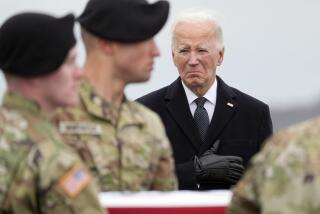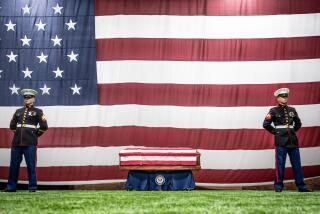Media allowed to see return of fallen soldier
- Share via
DOVER, DEL. — For the first time since an 18-year ban on news coverage of returning war dead was lifted, the media witnessed the arrival Sunday night of a soldier killed overseas.
After receiving permission from family members, the military opened Dover Air Force Base in Delaware to the news media. An eight-member team wearing white gloves and camouflage battle fatigues carried the body of 30-year-old Air Force Staff Sgt. Phillip Myers of Hopewell, Va., off a jet in a solemn ceremony on a cool, clear night.
Myers was killed Saturday in a roadside bombing near Helmand province, Afghanistan, the Department of Defense said.
The ceremony under the yellowish haze of airport floodlights took about 20 minutes. Myers’ wife and other family members attended.
Myers was a member of the 48th Civil Engineer Squadron with the Royal Air Force in Lakenheath, England, one of the bases the U.S. Air Force uses in the country. He was awarded a Bronze Star for bravery last year, the Department of Defense said.
The new Pentagon policy allows families to decide whether to admit the media to ceremonies at Dover, home to the nation’s largest military mortuary and the entry point to the U.S. for service personnel killed overseas.
Critics of the previous policy had said the government was trying to hide the human cost of war.
President Obama had asked for a review of the ban, and Defense Secretary Robert M. Gates said that the blanket restriction made him uncomfortable.
The administration will let families decide whether to allow photographs.
For example, if several caskets arrive on the same flight, news coverage will be allowed only for those whose families have given permission.
The ban was put in place by President George H.W. Bush in 1991, at the time of the Persian Gulf War. It was cast as a way to shield grieving families.
More to Read
Sign up for Essential California
The most important California stories and recommendations in your inbox every morning.
You may occasionally receive promotional content from the Los Angeles Times.













